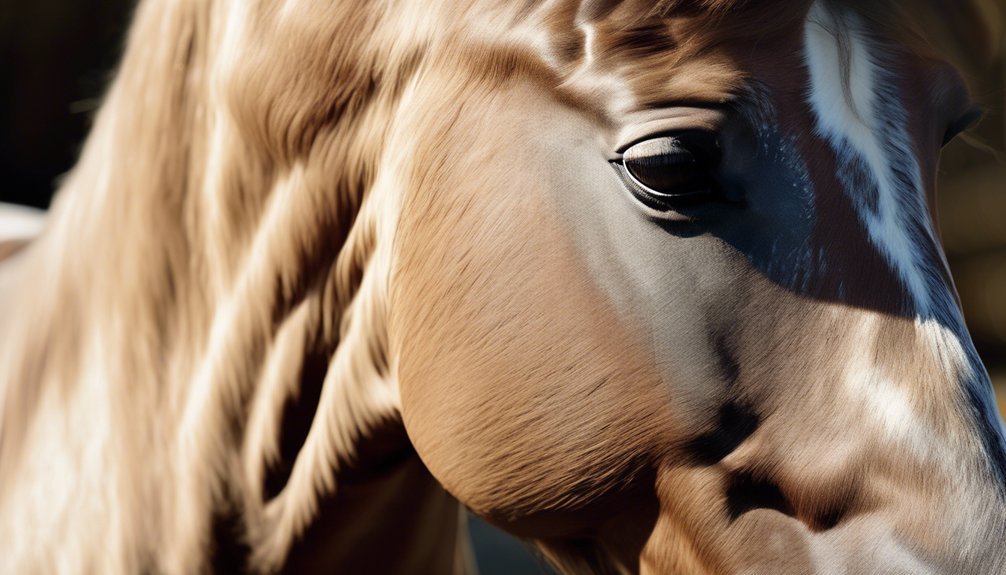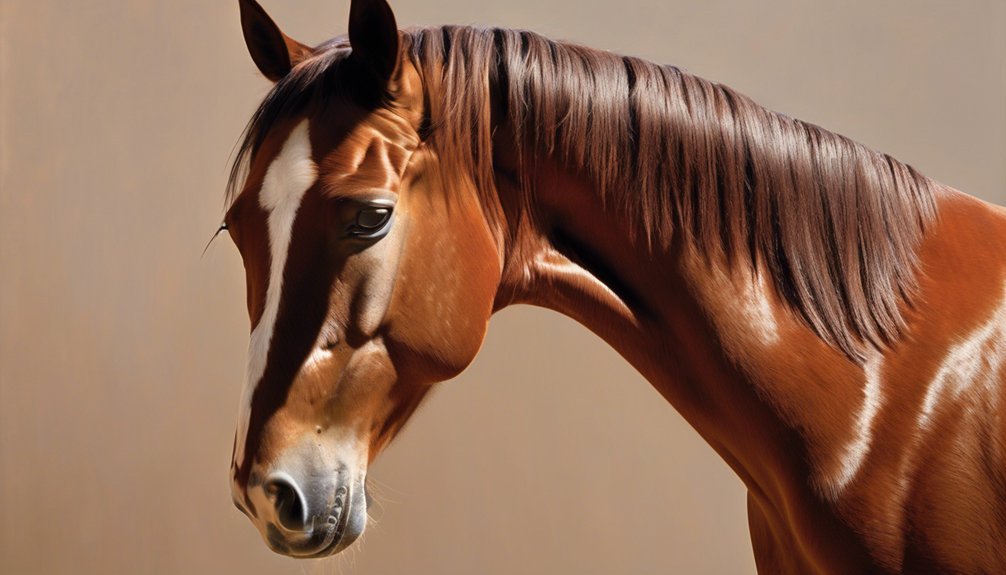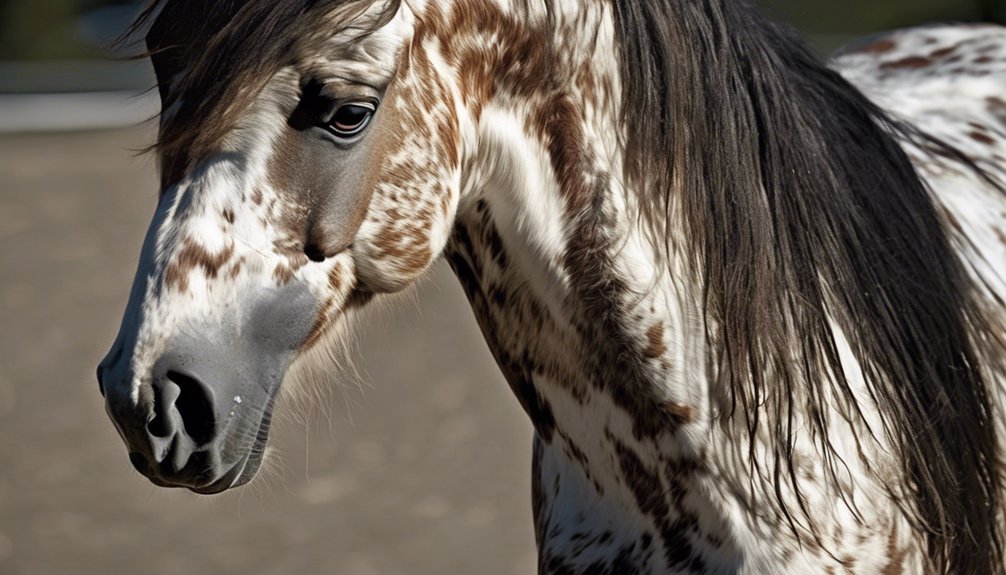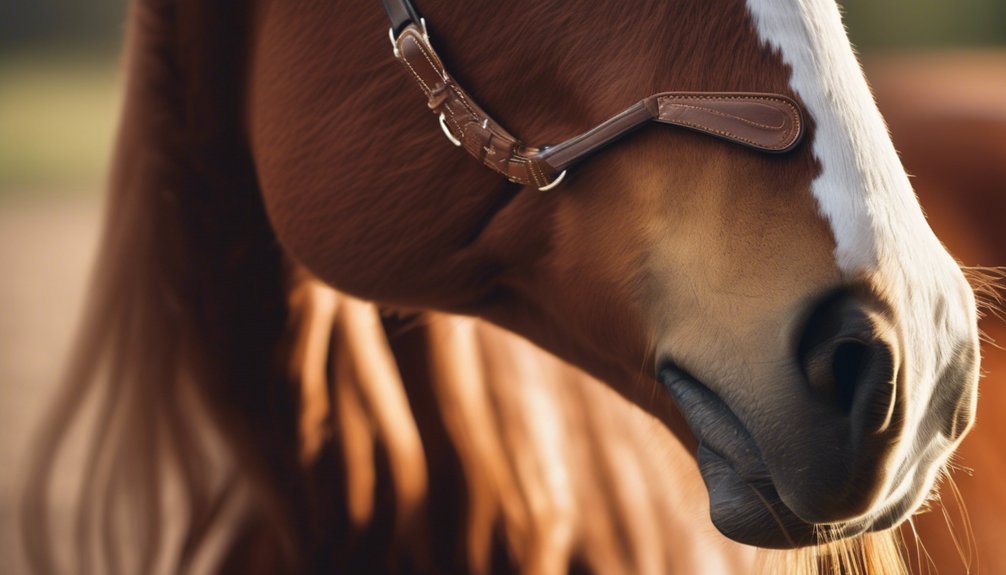
Just as the foundation of a house determines its stability, a horse's skin and coat are crucial to its overall health. The skin, composed of three layers, serves multiple functions including protection and thermoregulation. A shiny, healthy coat reflects proper care and nutrition, but neglect can lead to serious issues. Understanding the intricacies of skin and coat care is essential for every horse owner. What hidden signs might you be missing that could impact your horse's well-being?
Key Takeaways
- The horse's skin consists of three layers: epidermis for protection, dermis for support, and hypodermis for insulation and shock absorption.
- A healthy coat acts as a barrier against environmental stressors and aids in thermoregulation.
- Common skin conditions include fungal infections, allergic reactions, insect bites, and skin parasites, all of which require early detection and care.
- A balanced diet rich in essential nutrients like fatty acids, vitamins A and E, and biotin is vital for optimal skin and coat health.
- Regular grooming with appropriate tools enhances coat quality, fosters the horse-handler bond, and helps manage seasonal shedding.
The Structure and Function of Horse Skin

The skin of a horse serves as a vital barrier, protecting the animal from environmental hazards and pathogens. Its structure consists of three main skin layers: the epidermis, dermis, and hypodermis. Each layer plays a crucial role in maintaining skin integrity and overall health.
The epidermis provides a protective outer layer, while the dermis contains blood vessels, nerves, and connective tissue, supporting vitality. The hypodermis serves as insulation and shock absorption.
You'll notice various coat types among horses—some have thick, heavy coats for cold climates, while others boast sleek, thin coats suited for warmer environments. Understanding these skin layers and coat types helps you appreciate how your horse's skin functions to keep it safe and healthy.
The Importance of a Healthy Coat
A healthy coat is essential for your horse's overall well-being, acting as a protective barrier against environmental stressors and contributing to thermoregulation.
Proper coat maintenance plays a vital role in preventing issues such as dryness and irritation. Regular grooming helps remove dirt and debris, promoting healthy skin beneath.
You'll notice seasonal shedding as your horse transitions between coats; this natural process can be managed with consistent care and nutrition. Ensure your horse receives adequate vitamins and minerals to support a shiny, resilient coat.
Common Skin Conditions in Horses

While enjoying your time with horses, you'll want to be vigilant about common skin conditions that can affect their health.
Fungal infections, like ringworm, often manifest as circular patches of hair loss and can be quite contagious.
Allergic reactions, stemming from feed or environmental factors, may cause itching and inflammation, leading to excessive scratching.
Insect bites, particularly from flies and mosquitoes, can result in localized swelling and discomfort.
Additionally, skin parasites such as mites and lice can cause severe irritation and hair loss.
Regular grooming and thorough inspections can help you detect these issues early.
Nutritional Factors Affecting Skin and Coat Health
Horses' skin and coat health greatly relies on their nutrition. A balanced diet rich in essential nutrients is crucial. Incorporating dietary supplements can enhance your horse's coat shine and skin resilience.
Essential fatty acids, particularly omega-3 and omega-6, play a vital role in maintaining moisture and reducing inflammation. These fats support healthy cell membranes, which can improve skin barrier function.
Additionally, vitamins A, E, and biotin are important for promoting hair growth and skin repair. When selecting feed, ensure it contains high-quality ingredients that provide adequate protein and minerals.
Grooming Techniques for Optimal Skin and Coat Care

Effective grooming is essential for maintaining optimal skin and coat health in horses. Start by selecting appropriate grooming tools, such as curry combs, stiff brushes, and soft brushes, tailored to your horse's coat type.
During seasonal grooming, adjust your techniques; in spring, focus on removing shedding hair and dirt, while in winter, prioritize moisture retention with gentle brushing. Always check for skin irritations or parasites during these sessions.
Use a hoof pick to maintain hoof health, which directly affects overall well-being. Don't forget to wipe down sensitive areas like the face and legs with a damp sponge.
Regular grooming not only enhances your horse's appearance but also fosters a deeper bond between you and your equine companion.
Frequently Asked Questions
How Does Climate Affect a Horse's Skin and Coat Health?
Climate's significant impact on your horse's skin and coat health manifests through humidity effects and temperature fluctuations. High humidity can lead to skin infections, while temperature changes affect coat shedding and overall skin condition.
Can Stress Impact a Horse's Skin Condition?
Yes, stress can significantly impact a horse's skin condition. You might notice stress symptoms like agitation, which can lead to skin inflammation, affecting overall health. Managing stress is crucial for maintaining your horse's skin vitality.
What Are the Signs of an Allergic Reaction in Horses?
You might think allergic reactions in horses are rare, but they're not. Watch for skin irritation, hives, or swelling—these can signal allergic dermatitis. Early detection helps you manage your horse's comfort and health effectively.
How Often Should I Check My Horse's Skin for Issues?
You should include a skin inspection in your daily grooming routine. Regular checks help you spot issues early, ensuring your horse stays healthy and comfortable. Consistency is key to maintaining your horse's skin health.
What Role Do Parasites Play in Skin Problems?
Parasites can cause significant skin problems, leading to irritation and infections. You should prioritize parasite prevention and consider appropriate skin treatments to maintain your horse's health and comfort, ensuring a happier, more active life.
Conclusion
In conclusion, understanding your horse's skin and coat is crucial for their overall health. Just like a well-oiled machine runs smoothly, a well-maintained coat helps protect against environmental stressors and promotes comfort. By recognizing common skin conditions, ensuring proper nutrition, and employing effective grooming techniques, you can keep your horse looking and feeling its best. Remember, a little attention to their skin can go a long way in preventing issues down the road.





